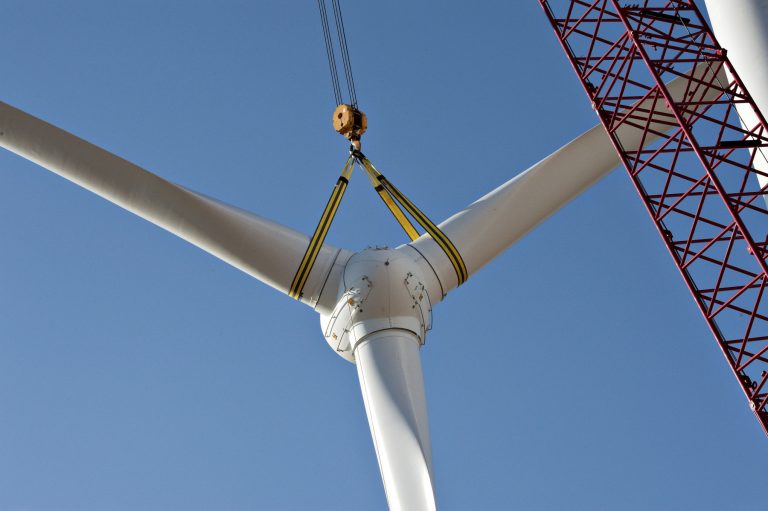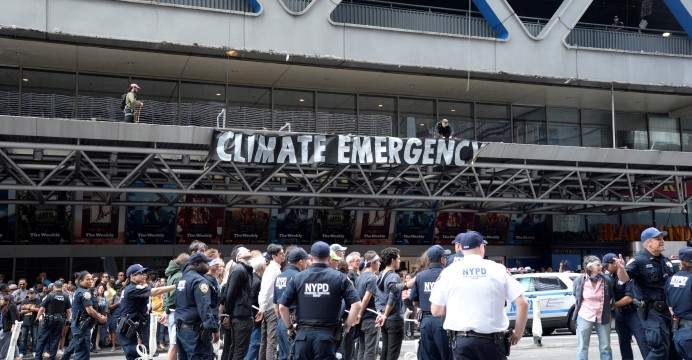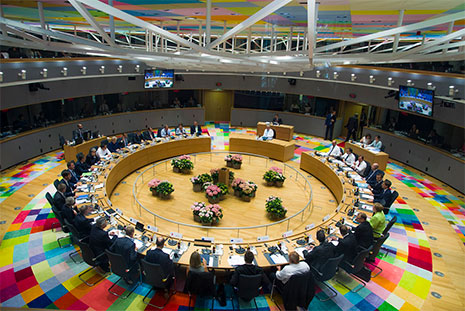The coming clash between climate and trade

By Jean Pisani-Ferry /Paris
The incoming president of the European Commission, Ursula von der Leyen, has laid out a highly ambitious climate agenda. In her first 100 days in office, she intends to propose a European Green Deal, as well as legislation that would commit the European Union to becoming carbon neutral by 2050. Her immediate priority will be to step up efforts to reduce the EU’s greenhouse-gas emissions, with the aggressive new goal of halving them (relative to 1990 levels) by 2030. The issue now is how to make this huge transition politically and economically sustainable.
Von der Leyen’s programme reflects growing concern over climate change among European citizens. Even before the continent’s recent heat wave, protests by high-school students and the surge in support for Green parties in the European Parliament election had been a wake-up call for politicians. Many now regard climate action not only as a responsibility to future generations, but also as a duty to today’s youth. And political parties fear that dithering could lose them support among huge numbers of voters under 40.
In truth, however, the EU (including the United Kingdom) is a minor contributor to climate change these days. Member states’ combined share of global CO2 emissions has declined from 99% two centuries ago to less than 10% today (in annual, not cumulative terms). And this figure could fall to 5% by 2030 if the EU meets von der Leyen’s emissions target by that date.
While the EU will undertake the painful task of cutting its annual emissions by 1.5bn tonnes, in 2030 the rest of the world will likely have increased them by 8.5bn tonnes. Average global temperatures will therefore continue to rise, possibly by 3C or more by 2100. Whatever Europe does will not save the planet.
How Europe deals with this frontrunner’s curse will be critical. The von der Leyen plan will inevitably cost jobs, curtail wealth, reduce incomes, and restrict economic opportunities, at least initially. Without an EU strategy for turning the moral imperative of climate action into a trump card, it won’t be tenable. A backlash will come, with ugly political consequences.
So what strategy might Europe adopt? One option is to bet on leading by example. By building an environmentally friendly development model, Europe and other climate pioneers would establish a path for others to take. And non-binding international agreements such as the 2015 Paris climate agreement would help to monitor progress, thereby pushing laggard governments to act.
But because climate preservation is a classic public good, climate coalitions are inherently unstable – and larger ones create even more incentive for members to defect and free-ride on others’ efforts. Leadership by example is thus unlikely to suffice.
Alternatively, Europe could build on its first-mover advantage to develop a competitive edge in new green technologies, products, and services. As Philippe Aghion and colleagues have argued, innovation can help tap the potential of such technologies and start changing the direction of economic development.
There are encouraging signs: the cost of solar panels has fallen faster than anticipated, and renewables are now more competitive than had been expected even ten years ago. Unfortunately, however, Europe has failed to convert climate action into industrial leadership. Most solar panels and electric batteries are produced in China, and the United States is its only serious competitor.
Europe’s remaining card is the size of its market, which still accounts for some 25% of world consumption. Because no global firm can afford to ignore it, the EU is a major regulatory power in areas such as consumer safety and privacy. Moreover, European standards often gain wider currency, because manufacturers and service providers that have adapted to demanding EU requirements tend to adhere to them in other markets, too.
The EU’s bet is that the combination of its own strong commitment to decarbonisation and the much softer, but global, Paris climate agreement will lead firms to redirect research and investment toward green technologies. Even if other countries do not set ambitious targets, the argument goes, enough investment may be redirected to make green development more affordable for all countries.
Yet current progress in this regard is clearly insufficient to curb global emissions and keep the global increase in temperature this century well below 2C above pre-industrial levels, as the Paris agreement stipulates. For example, global coal-powered capacity is still growing, because China and India are building plants faster than the US and Europe are dismantling them.
Europe is therefore short of tools that could make its transition to carbon neutrality economically and politically sustainable. In her address to the European Parliament, von der Leyen dropped a bomb: she promised to introduce a border tax aimed at preventing “carbon leakage,” or the relocation of carbon-intensive production to countries outside the EU.
Such a tax will win applause from environmentalists, who (often wrongly) believe that trade is bad for the world’s climate. More important, the measure would both correct competitive distortions and deter those tempted to abstain from taking part in the global climate coalition. As long as there is no binding climate agreement, a carbon border tax makes economic sense.
Yet such a tax won’t fly easily. Committed free traders (or what remains of them) will cry foul. Importers will protest. Developing countries and the US (unless it changes course) will portray the measure as protectionist aggression. And an already crumbling global trade system will suffer a new shock.
It is ironic that the new leaders of the EU, which has relentlessly championed open markets, will likely trigger a conflict between climate preservation and free trade. But this clash is unavoidable. How it is managed will determine both the fate of globalisation and that of the climate. – Project Syndicate
*Jean Pisani-Ferry, a professor at the Hertie School of Governance (Berlin) and Sciences Po (Paris), holds the Tommaso Padoa-Schioppa chair at the European University Institute and is a senior fellow at Bruegel, a Brussels-based think tank.








LONDON – The United Kingdom is now legally committed to reduce net greenhouse-gas emissions to zero by 2050. Opponents in Parliament argued for more cost-benefit analysis before making such a commitment; and Nobel laureate economist William Nordhaus argues that such analysis shows a much slower optimal pace of reduction.
The 2015 Paris climate agreement seeks to limit global warming to “well below 2°C” above preindustrial levels, while the Intergovernmental Panel on Climate Change recommended in 2018 that the increase be capped at 1.5°C. By contrast, Nordhaus’s model suggests limiting warming to 3.5°C by 2100. If that were the objective, net zero emissions would be acceptable far later than 2050.
But Nordhaus’s approach represents a misguided application of sophisticated modeling to decision-making under extreme uncertainty. All models depend on input assumptions, and Nordhaus’s conclusions rely crucially on assumptions about the additional harm of accepting 3.5°C rather than 2°C of global warming.
For some types of climate impact, quantitative estimates can be attempted. As the Earth warms, crop yields will increase in some colder parts of the world and decrease in hotter regions. Any estimate of the net economic impact is subject to wide margins of error, and it would be absurd to imagine that benefits in one region will be transferred to others that have been harmed, but at least modeling can help us to think through the possible scale of these effects.
But it is impossible to model many of the most important risks. Global warming will produce major changes in hydrological cycles, with both more extreme rainfall and longer more severe droughts. This will have severe adverse effects on agriculture and livelihoods in specific locations, but climate models cannot tell us in advance precisely where regional effects will be most severe. Adverse initial effects in turn could produce self-reinforcing political instability and large-scale attempted migration.
To pretend that we can model these first- and second-round effects with any precision is a delusion. Nor can empirical evidence from human history provide any useful guidance for how to cope with a world that warmed to Nordhaus’s supposedly optimal level. After all, 3.5°C warming above preindustrial levels would take us to global temperatures not seen for over two million years, long before modern human beings had evolved.
Modeled estimates of adverse impacts are also incapable of capturing the risk that global warming could be self-reinforcing, creating a nontrivial risk of catastrophic threats to human life on Earth. Recent Arctic temperature trends confirm climate model predictions that warming will be greatest at high latitudes. If this produces large-scale melting of the permafrost, huge amounts of trapped methane gas will be released, causing climate change to accelerate. The higher the temperature attained, the greater the probability of rapid and uncontrollable further warming. Models always struggle to capture such strongly endogenous and non-linear effects, but Nordhaus’s 3.5°C point of optimality could be a hugely unstable equilibrium.
Before the 2008 financial crisis many economists, including some Nobel laureates, believed that sophisticated “value at risk” (VaR) models had made the global financial system safer. Then-US Federal Reserve Chair Alan Greenspan was among them. In 2005, he reassuringly observed that the “application of more sophisticated approaches to measuring and managing risk” was one of the “key factors underpinning the greater resilience of our largest financial institutions.”
But those models provided no warning at all of impending disaster. On the contrary, they deluded bank managers, central bankers, and regulators into the dangerous belief that risks could be precisely foreseen, measured, and managed. VaR models could not capture the danger of catastrophic collapse resulting from endogenous self-reinforcing feedback loops within a complex and potentially fragile system. The same is true of supposedly sophisticated models purporting to discern the optimal level of global warming.
The economic costs of achieving carbon neutrality by mid-century are also uncertain. But we can estimate their maximum order of magnitude with far greater confidence than is possible when assessing the costs of adverse effects of climate change.
Achieving a zero-carbon economy will require a massive increase in global electricity use, from today’s 23,000 TW hours to as much as 90,000 TW hours by mid-century. Delivering this in a zero-carbon fashion will require enormous investments, but as the Energy Transitions Commission has shown, it is technically, physically, and economically feasible. Even if all those 90,000 TW hours were provided from solar resources, the total space requirement would be only 1% of Earth’s land surface area. And in real-world competitive energy auctions, solar and wind providers are already committing to deliver electricity at prices close to and sometimes below the cost of fossil fuel generation.
Total cost estimates must also account for the energy storage or backup capacity needed to cover periods when the wind doesn’t blow and the sun doesn’t shine, and for the complex challenge of decarbonizing heavy industrial sectors, such as steel, cement, and petrochemicals.
Added up across all economic sectors, however, it’s clear that the total cost of decarbonizing the global economy cannot possibly exceed 1-2% of world GDP. In fact, the actual costs will almost certainly be far lower, because most such estimates cautiously ignore the possibility of fundamental technological breakthroughs, and maintain conservative estimates of how long and how fast cost reductions in key technologies will occur. In 2010, the International Energy Agency projected a 70% fall in solar photovoltaic equipment costs by 2030. It happened by 2017.
Rather than relying on apparently sophisticated models, climate-change policy must reflect judgment amid uncertainty. Current trends threaten major but inherently unpredictable adverse impacts. Limiting global warming to well below 2°C will cost at most 1-2% of GDP, and those costs will come down if strong commitments to reduce emissions unleash technological progress and learning-curve effects. Given these realities, zero by 2050 is an economically rational target.